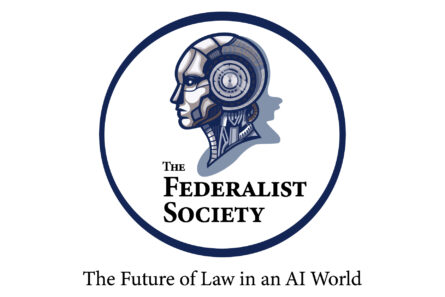The Future of Law in an AI World

October 8, 2024
Location: Washington, DC
All questions should be directed to [email protected].
Submit PaperRapid innovations in artificial intelligence (AI) have raised unprecedented legal and ethical questions. The development of AI-related technologies and capacities calls for a robust understanding of the varying issues, challenges, opportunities, and potential responses. The Federalist Society seeks to promote research and conversations addressing the legal implications of AI, emphasizing the preservation of our foundational values, the primacy of mankind, individual rights, and the rule of law.
We are proud to announce a new symposium on the legal and regulatory landscape of AI. We invite submissions from lawyers, scholars, policymakers, and other experts on the myriad issues surrounding AI and the law grounded in conservative legal principles.
Based upon the papers submitted, the Editorial Committee will select eight winners and eight runner-ups from across the topic categories. Winners will receive a total $7,500 award each, and runner-ups will receive a total $2,500 award each.
Constitutional Implications of AI: Exploring how the deployment and regulation of AI intersect with fundamental rights enshrined in the Constitution.
AI and Property Rights: Assessing the challenges and innovations AI brings to property rights, including intellectual property and data ownership.
AI in the Courts: The potential implications for due process, evidentiary standards, and the broader judicial system.
AI Ethics: Navigating the balance between individual freedoms, innovation, and the moral and societal implications of AI.
AI and National Security: Addressing the implications of AI for defense, surveillance, privacy, and our nation’s cybersecurity infrastructure.
AI and Foreign Policy: Understanding the role of international law and the potential for collaboration or conflict with other nations in AI governance and contemplating the questions posed by international regulations, treaty-making bodies, trade and science policy, export controls, and intellectual property protections.
The Regulation of AI: Evaluating whether AI represents a new subject for regulation or not, and taking into account the state and federal regulatory approach(es) inclusive of innovation and accountability for harms. Potential questions of how current state and federal regulatory regimes will promote or inhibit innovation or accountability for harms, and examining alternative regulatory approaches. Discussion of the principle of federalism may be explored.
AI and Competition Policy: When “big data” became a popular notion, competition advocates began to describe “data as the new oil.” We learned quickly that merely having a lot of data is insufficient for building competitive moats.
AI and Intellectual Property: Examining the existing uses of publicly accessible data for training large AI models, and the intellectual property rights of those who want to control the works that they own. Evaluation of the tradeoffs to multiple parties, and examination of alternative regulatory regimes—that may or may not include new types of property rights.
AI and the Legal Profession: Thinking through different ways that AI may change the practice of law—whether with legal research, brief writing, evidence, and how the judiciary may react to such changes. Also, an exploration of legal ethics, the current regime or potential future regime for model rules of professional conduct. Other potential topics may involve increased access to legal services, and the existing impact on legal licensure or the legal profession.
You may select a different topic from those identified above that explore the nexus between AI and the law.
Abstracts
- Authors should submit an abstract totaling between 250 – 500 words.
- Authors should include a brief biography and contact information.
- Authors may submit abstracts for up to three distinct topics.
- Individuals may coauthor.
Final Papers
- Papers should be original and not previously published.
- Submissions should conform to the Bluebook system of citation.
- Final papers should be between 10,000 – 30,000 words.
CFP Announced – Proposal submission open now
April 30, 2024 – Submission deadline for abstracts (250 – 500 words)
If your abstract is accepted, the final draft of your paper will be due in September.
June 1, 2024 – Notification that your abstract proposal was accepted
September 1, 2024 – Final draft of your paper is due for prize consideration
Early October 2024 – Symposium Event
All submissions will undergo a review by our editorial committee.
- Authors will be given the chance to present their papers and participate in The Federalist Society’s “The Future of Law in an A.I. World Symposium.”
- Selected papers will be considered for publication in an academic publication—whether law review or journal.
- Excellent opportunities to network and build relationships with like-minded legal professionals, scholars, and policy makers.
- Engage in meaningful discussions that shape the future of legal thought on AI, and the meaningful opportunities it may make in the future.
- Based upon the papers submitted, the Editorial Committee will select eight winners and eight runner-ups from across the topic categories. Winners will receive a total $7,500 award each, and runner-ups will receive a total $2,500 award each.
- The Editorial Committee reserves the right to reward more than two papers cash awards in categories.
Our website for updates and the latest information: The Future of Law in an AI World
All questions should be directed to [email protected]
We eagerly anticipate a robust exchange of ideas, grounded in our shared commitment to the principles that have guided our nation since its founding. As AI continues to evolve, it is crucial for Conservative voices grounded in our founding principles to be at the forefront of these discussions, ensuring that our values and legal traditions are preserved for future generations.
The Federalist Society and Regulatory Transparency Project take no position on particular legal or public policy matters. All expressions of opinion are those of the speaker(s). To join the debate, please email us at [email protected].



